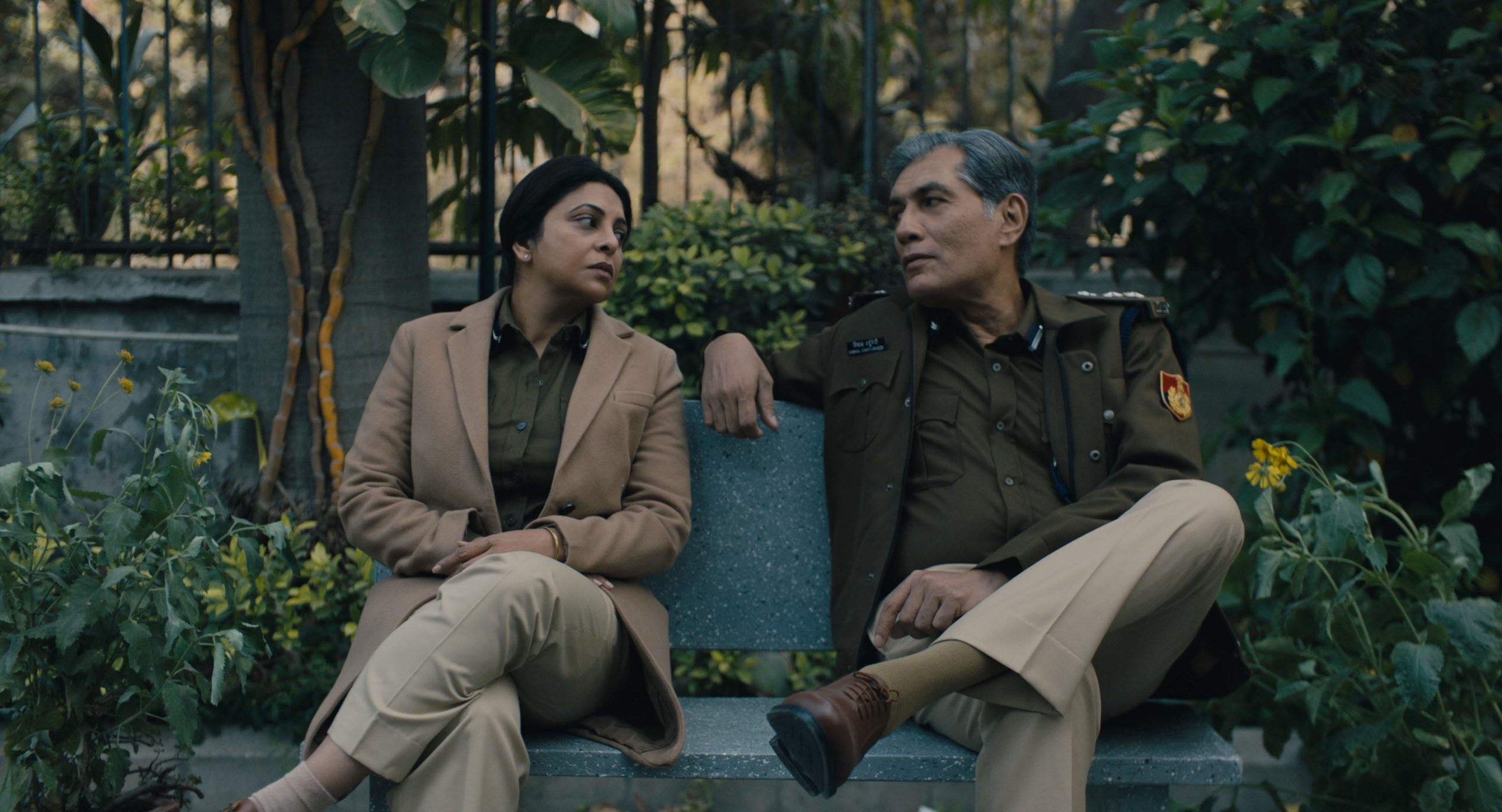From Jessica Ford (University of Newcastle, Australia), Tanya Horeck (Anglia Ruskin University, UK), Anna Backman Rogers (University of Gothenburg, Sweden) and Anna Misiak (Falmouth University, UK) comes The Female Detective on TV.
To coincide with the publication of MAI: Feminism and Visual Culture’s issue on the Female Detective on TV, this collaboratively-created playlist features several of the collection’s contributors offering their recommendations of TV shows featuring female detectives. For decades, the female detective has occupied space within the crime TV genre that has been all-too-often reserved for the celebratory storylines of self-sacrificial men. She has served to break down sexist barriers placed before women within professional and personal frameworks, acting as an on-screen surrogate and inspiration for (female) spectators. The popularity of female-led TV crime dramas across the world points to her success in captivating widespread audience attention.
We hope this playlist and our issue opens further debate on the subject of the female detective in all her guises. Our definition of the female detective is broad and inclusive. She can, but doesn’t have to be, a private eye or a police professional, just as long as she pursues social justice or truth. To stay true to MAI spirit, the collection of TV shows examined in the issue and listed below present an intersectional and multivalent feminist perspective. The female detective and representations of women crime investigators on the screen are indicative of, and related to, many social, cultural and political contexts.
The issue includes critical reflections, video essays and creative responses that consider: what new feminist visions of the female detective have emerged with changes in industrial practices and the growth of online streaming and niche television? How does the female detective of streaming TV compare to the images of the female detective found in the middlebrow crime dramas of linear TV? In an era of networked media in which popular feminism and popular misogyny are more intertwined than ever before, what notions of empowerment are articulated through the figure of the female detective? To what extent does the female detective enable an exploration of central issues regarding female subjectivity and political resistance against systemic forms of violence?
FROM JULIA HAVAS (DE MONTFORT UNIVERSITY, UK), AUTHOR OF “‘I HAVE A PARTICULAR SET OF SKILLS THAT NOT EVERY DETECTIVE POSSESSES. FOR INSTANCE, I AM A WOMAN.’ SOCIALIST SUPERWOMANHOOD AND POLICING THE NATION IN LINDA”

Linda (György Gát, 1984-91) stars Nóra Görbe as the eponymous “girl detective” who in her episodic crime fighting adventures deploys her Taekwon-do mastery against Hungary’s criminal underworld, the series is a winkingly heady cocktail of Western, East Asian and Eastern European TV and film genre tropes yet utterly unique. Linda’s genre hybridity encapsulates late socialism’s politically-culturally transitional period: the episodic procedural/martial arts combination is channelled through Hungarian comedy traditions and local cultural references. As detective heroine, Linda is marked by an overdetermined nonconformity linked to her gender and its ambiguous corporeality.
Read Julia Havas’s essay here. Although the television series is hard to find online, it looks like some DVDs are available.
FROM ANDREA BRAITHWAITE (ONTARIO TECH UNIVERSITY, CANADA), AUTHOR OF “LOST GIRL: POPULAR FEMINISM AND FABLES”

Lost Girl (Showcase, Michelle Lovretta, 2010-2015) is a supernatural Canadian series, protagonist Bo (Anna Silk) is a bisexual, polyamorous, crime-solving succubus. Raised by humans to later discover that she’s part of a secretive magical society known as the Fae, Bo teams up with her human bestie Kenzi (Ksenia Solo) to solve Fae crimes that have spilled over into the human world. As the series progresses it shifts from its mystery-of-the-week format to season-long narrative arcs, and to a predominantly female cast. Combining an action heroine narrative with elements of fairy tale and folklore, Lost Girl is a soapy and steamy urban fantasy.
Read Andrea Braithwaite’s essay here. Lost Girl is available to stream on NOW.
FROM SO MAYER (INDEPENDENT SCHOLAR, UK), AUTHOR OF “THICK DESCRIPTION/ANATOMY OF A SCENE: TOP OF THE LAKE CHINA GIRL EPISODE 3 CHAPTER 6”
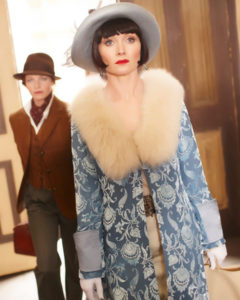
Miss Fisher’s Murder Mysteries (ABC Australia & Netflix, Deb Cox & Fiona Eagger, 2012-2015). Yes, I love Top of the Lake (Sundance/ABC, 2013, 2017). But during lockdown did I really want to be too scared to leave the sofa when my world was already so curtailed? No. So rather than Jane Campion’s South Island and Sydney-set mini-series, I returned to another Antipodean feminist detective show, one whose cases often equally plumb the depths of patriarchy (with a particular fondness for the desperate effects of the double standard, especially when contraception and abortion are illegal) but with an élan and despatch that are worn more lightly than Robin Griffins’ (Elisabeth Moss) heavy burdens. Is Miss Fisher escapist? Absolutely. The things she escapes from include a sealed water tank, a psychotic Egyptologist, and her own father: the metaphor may be lightly worn, but heteropatriarchy is never far away. Reminding us that escape is possible, and a route to justice besides, Miss Fisher has been the only thing this year that has kept my wits (and trouser creases) sharp – if not sharp enough to keep up with her.
Read So Mayer’s anatomy of ‘China Girl’ Top of the Lake here. Miss Fisher’s Murder Mysteries are available to stream in various places online from Acorn TV to YouTube and Top of the Lake is available on Netflix.
FROM JULIA SATTLER (TU DORTMUND UNIVERSITY, GERMANY), AUTHOR OF “STELLA: SUBJECT – FEMINIST GRAMMAR AND FEMALE AGENCY IN THE FALL”
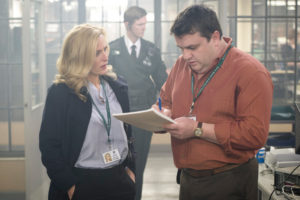
The Fall (BBC2 & Netflix, Allan Cubitt, 2013-) follows Detective Stella Gibson to Belfast, where she is asked to conduct a review of an unsolved murder case, and soon becomes part of the investigation. The central characters, investigator Stella Gibson – played by Gillian Anderson – and the killer, Paul Spector – played by Jamie Dornan – get into a cat-and-mouse game with each other. While searching for the killer, Anderson’s character also has to fight misogyny among the police, and the way her self-determination and independence is judged by others.
Julia Sattler’s essay is available to read here. The Fall can be found many places including Netflix.
FROM BARBARA SELZNICK (UNIVERSITY OF ARIZONA, USA), AUTHOR OF “‘HOW COULD YOU NOT KNOW?’: THE EPISTEMOLOGICAL PRECARITY OF THE FEMALE DETECTIVE AS MOTHER”

Broadchurch (ITV, Chris Chibnall, 2013-2017). The first season of this crime drama starring David Tennant and Olivia Colman examines how the murder of a young boy affects a small, coastal town. The remaining seasons explore other crimes but all focus on their impact on communities. Beyond the performances by its lead actors (as well as other cast members), Broadchurch is distinguished by its evocative juxtaposition of image and sound to create both a sense of place and feelings of despair. I am still haunted by a scene in which Jodie Whittaker, playing the mother of the dead boy, simply goes to the grocery store.
Barbara Selznick’s essay can be read here. Broadchurch is available on Amazon, YouTube, and GooglePlay.
FROM AMY BOYLE (UNIVERSITY OF WOLLONGONG, AUSTRALIA), CO-AUTHOR OF “THE EMOTIONAL DETECTIVE: GENDER, VIOLENCE AND THE POST-FORENSIC CRIME TV DRAMA”
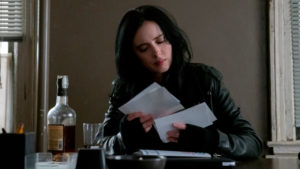
Jessica Jones (Netflix, Melissa Rosenberg, 2015-2019) merges the superhero and crime drama genres to ask provocative questions about gender, justice and authority. Jessica Jones was the first superpowered women-led entry in the Marvel Cinematic Universe; its place on Netflix raising questions about where women characters and audiences fit within the franchise. Where most super-powered men channel their traumas into the establishment of superhero identities, as I’ve written in The Conversation, Jones’ traumas lead her to question the whole hero narrative and she uses her powers to work as a morally ambiguous PI, investigating and fighting from the margins. More hardboiled detective than superpowered vigilante, Jessica Jones (Krysten Ritter) eschews the black and white, the good and evil, to reside in the greys, purples and in-betweens.
Jessica Ford and Amy Boyle’s essay can be read here. Jessica Jones can be found on Netflix.
FROM PHOEBE MACROSSAN (INDEPENDENT SCHOLAR, AUSTRALIA), AUTHOR OF “‘I’M STILL JENNY FROM THE BLOCK:’ JENNIFER LOPEZ AS NYPD DETECTIVE HARLEE SANTOS IN SHADES OF BLUE”

Shades of Blue (NBC, Adi Hasak, 2016–2018). Jennifer Lopez plays Harlee Santos, a struggling single mother and crooked cop working in Brooklyn, covering up her team’s dodgy dealings and taking her cut of protection money. When she is cornered by an FBI agent she is forced to turn into an informant on her own team in order to protect her daughter and stay out of jail herself.
Phoebe Macrossan’s essay can be read here. Shades of Blue is available to rent on Amazon.
FROM CLAIRE MORTIMER (INDEPENDENT SCHOLAR, UK), AUTHOR OF “‘AN OLD CHARACTER BAG’: JOAN HICKSON AS MISS MARPLE”
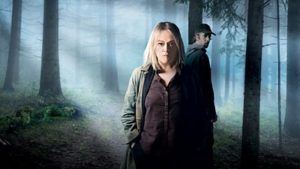
Hidden (BBC, Mark Andrew & Ed Talfan, 2018- ). After the success of Hinterland (BBC 2013-2016), where the Welsh landscape was the star, Hidden (Craith) is a continuation of the bleak but beautiful bilingual crime drama, except with a female lead. Sian Reese-Williams plays Detective Inspector Cadi John, a former soldier, whose superlative detecting skills are fuelled by nicotine and junk food. A third series is in the making for broadcast later this year.
Claire Mortimer’s essay is available to read here. Hidden is available to stream (for UK audiences) via BBC iPlayer.
FROM DEVALEENA KUNDU (UNIVERSITY OF PETROLEUM AND ENERGY STUDIES, INDIA), AUTHOR OF “POPULAR CULTURE AND THE FORENSIC FEMALE GAZE: A STUDY ON THE NATURE OF FEMALE DETECTION IN UNBELIEVABLE”

Delhi Crime (Netflix, Richie Mehta, 2019) follows Deputy Commissioner of Police Vartika Chaturvedi (played by Shefali Shah) and her team’s investigation of a brutal gang rape in Delhi, the capital of India. Based on the Nirbhaya gang rape and murder case of 2012, the series focuses on Chaturvedi’s efforts to nab the perpetrators amidst increasing political and public uproar demanding justice. Despite some of the rape myths and gendered stereotypes the series perpetuates, it succeeds in drawing attention to the larger issue of women’s safety in India.
Devaleena Kundu’s essay can be read here and Delhi Crime is available to stream on Netflix.
FROM MARIA ELENA D’AMELIO (UNIVERSITY OF SAN MARINO, REPUBLIC OF SAN MARINO) AND VALENTINA RE (LINK UNIVERSITY, ITALY), AUTHORS OF “NEITHER VOICELESS NOR UNBELIEVABLE: WOMEN DETECTIVES, FEMINISM, AND RAPE CULTURE IN CONTEMPORARY ITALIAN MEDIA PRODUCTIONS”

Thou Shalt Not Kill (Non uccidere, Claudio Corbucci 2015-2018). Detective Valeria Ferro (Miriam Leone) investigates crimes motivated by jealousy, vendettas and repressed anger to seek the truth and justice. The Italian series is a particularly innovative example of the impact of European Nordic Noir on the Italian context.
Imma Tataranni – Deputy Prosecutor (Imma Tataranni – Sostituto Procuratore, Francesco Amato, 2019 -). Imma Tataranni is deputy prosecutor of the Public Prosecutor’s Office of Matera. Strong woman, determined and full of resources, she balances work and family life and firmly believes in justice. The series is an example of female character’s innovation in the tradition of the Mediterranean Noir.
Voiceless (Bella da morire, Andrea Molaioli 2020) is an Italian miniseries of 8 episodes centred on Eva Cantini (Cristiana Capotondi), a police detective specialised in sex-based hate crimes. The series is a balanced and conscious renegotiation of the characteristics of European Nordic Noir in the Italian context.
Elena D’Amelio and Valentina Re’s essay is available to read here. The television programmes are available through RaiPlay (links in the entries).
FROM TANYA HORECK (ANGLIA RUSKIN UNIVERSITY, UK), AUTHOR OF JUSTICE ON DEMAND: TRUE CRIME IN THE DIGITAL STREAMING ERA
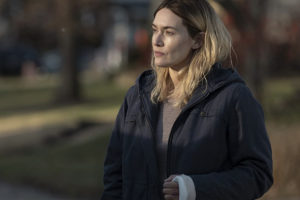
Mare of Easttown (HBO, Brad Ingelsby, 2021)
Mare of Easttown (HBO, Brad Ingelsby, 2021). Drawn in by the cultural chatter surrounding Mare of Easttown, I binge-watched it in a day but I found its framing of sexual harm and ‘women-in-peril’ storylines problematic. There is a side plot involving the kidnapping of young white women that is totally contrived, and the decision to frame the sexual abuse of a teenager by an older male relative as a ‘relationship’ is ill judged. What makes Mare of Easttown fascinating, though, is how it reveals the intense cultural investment in the figure of the white female TV detective. If viewers loved this show, it was because of Kate Winslet and her transformation into the beer-drinking, flannel-shirt-wearing, ‘grizzled’ middle-aged female detective, Mare Sheehan. There is, however, something troubling about the evident pleasure viewers found in Winslet/Mare. As Sarah Mesle has lucidly argued, the fantasy of white femininity on display in the series is inextricably connected to carceral visions and copaganda. What demands further interrogation, then, is how the affective investment in the figure of the female detective relates to this particular cultural moment and the broader cultural fantasies that are being woven around criminality and social justice.
Tanya Horeck’s introduction to this edited collection is available here. Mare of Easttown is available to stream on HBO Max and Now).
